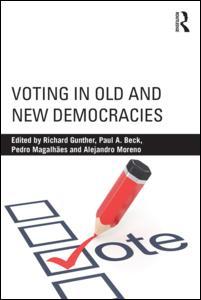Voting in Old and New Democracies
Coordonnateurs : Gunther Richard, Beck Paul A., Magalhães Pedro C., Moreno Alejandro

Voting in Old and New Democracies examines voting behavior and its determinants based on 26 surveys from 18 countries on five continents between 1992 and 2008. It systematically analyzes the impact on voting choice of factors rooted in the currently dominant approaches to the study of electoral behavior, but adds to this analysis factors introduced or reintroduced into this field by the Comparative National Elections Project (CNEP)?socio-political values, and political communication through media, personal discussion, and organizational intermediaries. It demonstrates empirically that these long-neglected factors have significant political impact in many countries that previous studies have overlooked, while "economic voting" is insignificant in most elections once long-term partisan attitudes are taken into consideration. Its examination of electoral turnout finds that the strongest predictor is participation by other family members, demonstrating the importance of intermediation. Another chapter surveys cross-national variations in patterns of intermediation, and examines the impact of general social processes (such as socioeconomic and technological modernization), country-specific factors, and individual-level attitudinal factors as determinants of those patterns. Complementing its cross-national comparative analysis is a detailed longitudinal case study of one country over 25 years. Finally, it examines the extent of support for democracy as well as significant cross-national differences in how democracy is understood by citizens.
Written in a clear and accessible style, Voting in Old and New Democracies significantly advances our understanding of citizen attitudes and behavior in election settings.
Selected Contents: 1. Introduction Pedro C. Magalhães, with Paul A. Beck, Richard Gunther and Alejandro Moreno 2. Global Patterns of Exposure to Political Intermediaries Paul A. Beck and Richard Gunther 3. Mobilization, Informal Networks and the Social Contexts of Turnout Pedro C. Magalhães, with Paolo Segatti and Tianjian Shi 4. Value Cleavages Revisited Alejandro Moreno 5. The Changing Determinants of the Vote Richard Gunther, Marina Costa Lobo, Paolo Bellucci and Marco Lisi 6. Parties, Elections, Voters and Democracy Robert Mattes, with Saiful Mujani, R. William Liddle, Tianjian Shi and Yun-han Chu 7. Intermediation, Mobilization and Citizen Participation: Findings from In-Depth and Longitudinal Analyses of Spain Richard Gunther, José Ramón Montero and Hans-Jürgen Puhle 8. Conclusion Alejandro Moreno, with Paul A. Beck, Richard Gunther and Pedro C. Magalhães
Paul A. Beck is Professor Emeritus of Political Science at the Ohio State University.
Richard Gunther is Professor Emeritus of Political Science at the Ohio State University.
Pedro C. Magalhães is principal researcher at the Institute of Social Sciences of the University of Lisbonand scientific director of the Francisco Manuel dos Santos Foundation.
Alejandro Moreno is Professor of Political Science at the Instituto Tecnológico Autónomo de México (ITAM), and Director of Public Opinion Research at Reforma newspaper, both in Mexico City.
Date de parution : 09-2015
15.2x22.9 cm
Date de parution : 09-2015
15.2x22.9 cm
Disponible chez l'éditeur (délai d'approvisionnement : 14 jours).
Prix indicatif 172,36 €
Ajouter au panierThème de Voting in Old and New Democracies :
Mots-clés :
Comparative Politics; Elections & Voting; Public Opinion; Campaigns & Elections; Informal Networks; Politics & the Media; Mobilization; Political Parties; Comparative National Elections Project; Democracy; Pedro C; Magalhães; Paul A; Beck; Alejandro Moreno; Paolo Segatti; Tianjian Shi; Marina Costa Lobo; Paolo Bellucci; Marco Lisi; Robert Mattes; Saiful Mujani; R; William Liddle; Yun-han Chu; José Ramn Montero; Hans-Jürgen Puhle; Pedro Magalhães; CNEP; CNEP Survey; Socioeconomic Development; CNEP Country; CNEP Data; Western Template; Socialist PSOE; Multivariate Equation; Socio-political Values; Secondary Associations; Discussion Networks; Partisan Motivated Reasoning; Interpersonal Political Discussion; West Germany; Informal Social; Party Contacts; Franco Regime; Socio-demographic Determinants; Intermediation Variables; Traditional Conservative Values; Adult Political Socialization; Prominent Political Elites; Long Term Determinants; Intentional Mobilization



